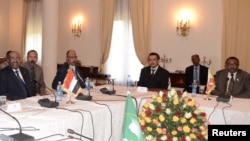ADDIS ABABA —
Sudan and South Sudan agreed on Saturday to start implementing all outstanding agreements immediately at the close of a two-day summit in Addis Ababa between Sudanese President Omar al-Bashir and South Sudanese President Salva Kiir.
African Union mediator and former South African president Thabo Mbeki says the two heads of state discussed the Abyei region, security, demarcation of the border zone and the implementation of the existing agreements.
“On Abyei, they agreed that actions will be taken immediately by the Abyei Joint Oversight Committee Ad-hoc to constitute the various institutions that were agreed: that is the administration, the Abyei Council as well as establish the Abyei area police service. They have also agreed that action should be taken immediately, or maybe as soon as possible, to implement all the existing agreements, unconditionally.”
The final status of Abyei will be decided upon after those matters are put into place.
The Joint Political and Security Mechanism, known as the JPSM, will prepare a time frame by mid-January to outline when the agreements have to be implemented. It is not clear what will happen if the deals are not put into force within the timetable.
Mbeki says the JPSM also will finalize the arrangements for a safe demilitarized border zone. A panel of experts will work on the disputed areas.
“The parties have agreed some time ago that team of experts will provide a non-binding opinion to the two parties about the five disputed areas," he said. "So what has been agreed is that they should proceed, the two parties, to engage with that team of experts. As soon as they have agreed after that meeting with the team of experts, the presidents will then meet, consider the matter of how to deal with the issue of the claimed areas.”
South Sudan stated after the first summit day that they proposed international arbitration if the two countries cannot agree on the panel's opinions. Decisions on this will only be taken after the panel comes up with its conclusions.
South Sudan separated from Sudan in 2011 following a peace agreement that ended decades of war. The countries have been in disputes ever since. This led to South Sudan shutting down its oil production last year, an important source of income for both countries. The agreement on oil falls under the existing accords that have yet to be implemented.
Mbeki said that the oil agreements were not discussed separately.
“So what the presidents have said is that all existing agreements must be implemented without any preconditions. So what is going to be necessary is that all of the various teams that deal with these various things, will have to get together to implement," said Mbeki. "So there was no specific discussion on any one of these, whether its oil, or trade or whatever but that all existing agreements must be implanted without delay and unconditionally.”
Ethiopian Prime Minister Hailemariam Desalegn invited the two presidents for an extraordinary summit as Sudanese troops along the border were increasing in number and South Sudan accused its neighbor of ground attacks within its territory.
African Union mediator and former South African president Thabo Mbeki says the two heads of state discussed the Abyei region, security, demarcation of the border zone and the implementation of the existing agreements.
“On Abyei, they agreed that actions will be taken immediately by the Abyei Joint Oversight Committee Ad-hoc to constitute the various institutions that were agreed: that is the administration, the Abyei Council as well as establish the Abyei area police service. They have also agreed that action should be taken immediately, or maybe as soon as possible, to implement all the existing agreements, unconditionally.”
The final status of Abyei will be decided upon after those matters are put into place.
The Joint Political and Security Mechanism, known as the JPSM, will prepare a time frame by mid-January to outline when the agreements have to be implemented. It is not clear what will happen if the deals are not put into force within the timetable.
Mbeki says the JPSM also will finalize the arrangements for a safe demilitarized border zone. A panel of experts will work on the disputed areas.
“The parties have agreed some time ago that team of experts will provide a non-binding opinion to the two parties about the five disputed areas," he said. "So what has been agreed is that they should proceed, the two parties, to engage with that team of experts. As soon as they have agreed after that meeting with the team of experts, the presidents will then meet, consider the matter of how to deal with the issue of the claimed areas.”
South Sudan stated after the first summit day that they proposed international arbitration if the two countries cannot agree on the panel's opinions. Decisions on this will only be taken after the panel comes up with its conclusions.
South Sudan separated from Sudan in 2011 following a peace agreement that ended decades of war. The countries have been in disputes ever since. This led to South Sudan shutting down its oil production last year, an important source of income for both countries. The agreement on oil falls under the existing accords that have yet to be implemented.
Mbeki said that the oil agreements were not discussed separately.
“So what the presidents have said is that all existing agreements must be implemented without any preconditions. So what is going to be necessary is that all of the various teams that deal with these various things, will have to get together to implement," said Mbeki. "So there was no specific discussion on any one of these, whether its oil, or trade or whatever but that all existing agreements must be implanted without delay and unconditionally.”
Ethiopian Prime Minister Hailemariam Desalegn invited the two presidents for an extraordinary summit as Sudanese troops along the border were increasing in number and South Sudan accused its neighbor of ground attacks within its territory.








